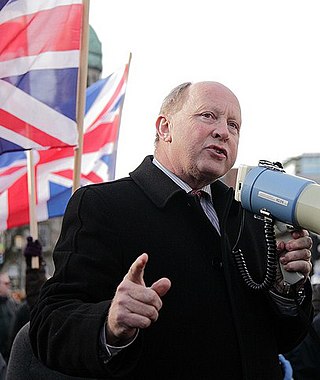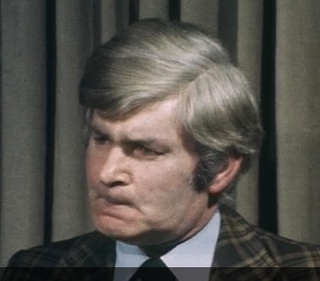Related Research Articles

The Loyalist Volunteer Force (LVF) was an Ulster loyalist paramilitary group in Northern Ireland. It was formed by Billy Wright in 1996 when he and his unit split from the Ulster Volunteer Force (UVF) after breaking its ceasefire. Most of its members came from the UVF's Mid-Ulster Brigade, which Wright had commanded. In a two-year period from August 1996, the LVF waged a paramilitary campaign in opposition to Irish republicanism and the Northern Ireland peace process. During this time it killed at least 14 people in gun and bomb attacks, almost all of them Catholic civilians killed at random. The LVF called off its campaign in August 1998 and decommissioned some of its weapons, but in the early 2000s a loyalist feud led to several killings. Since then, the LVF has been largely inactive, but its members are believed to have been involved in rioting and organized crime. In 2015, the security forces stated that the LVF "exists only as a criminal group" in Mid-Ulster and Antrim.

Ian Richard Kyle Paisley, Baron Bannside, was a loyalist politician and Protestant religious leader from Northern Ireland who served as leader of the Democratic Unionist Party (DUP) from 1971 to 2008 and First Minister of Northern Ireland from 2007 to 2008.

The Ulster Defence Association (UDA) is an Ulster loyalist paramilitary group in Northern Ireland. It was formed in September 1971 as an umbrella group for various loyalist groups and undertook an armed campaign of almost 24 years as one of the participants of the Troubles. Its declared goal was to defend Ulster Protestant loyalist areas and to combat Irish republicanism, particularly the Provisional Irish Republican Army (IRA). In the 1970s, uniformed UDA members openly patrolled these areas armed with batons and held large marches and rallies. Within the UDA was a group tasked with launching paramilitary attacks that used the cover name Ulster Freedom Fighters (UFF) so that the UDA would not be outlawed. The British government proscribed the UFF as a terrorist group in November 1973, but the UDA itself was not proscribed until August 1992.

Robert Thomas William McCrea, Baron McCrea of Magherafelt and Cookstown is a Democratic Unionist Party (DUP) politician, Christian singer and retired Free Presbyterian minister from Northern Ireland. As a politician, he represented South Antrim and Mid Ulster as their Member of Parliament (MP), representing Mid Ulster from 1983 to 1997; then South Antrim between 2000 and 2001, and then again from 2005 to 2015.

James Hugh Allister is a British Unionist politician and barrister in Northern Ireland. He founded the Traditional Unionist Voice (TUV) political party in 2007, leading the party since its formation. Allister has served as a Member of the Northern Ireland Assembly (MLA) for North Antrim since 2011, and is the TUV’s only representative in the Assembly.

Ulster loyalism is a strand of Ulster unionism associated with working class Ulster Protestants in Northern Ireland. Like other unionists, loyalists support the continued existence of Northern Ireland within the United Kingdom, and oppose a united Ireland independent of the UK. Unlike other strands of unionism, loyalism has been described as an ethnic nationalism of Ulster Protestants and "a variation of British nationalism". Loyalists are often said to have a conditional loyalty to the British state so long as it defends their interests. They see themselves as loyal primarily to the Protestant British monarchy rather than to British governments and institutions, while Garret FitzGerald argued they are loyal to 'Ulster' over 'the Union'. A small minority of loyalists have called for an independent Ulster Protestant state, believing they cannot rely on British governments to support them. The term 'loyalism' is usually associated with paramilitarism.
Hugh Ross is an Ulster nationalist politician, Presbyterian minister and member of the Orange Order, who was previously the leader of the now defunct Ulster Independence Movement (UIM).
The Ulster Loyalist Central Co-ordinating Committee (ULCCC) was set up in 1974 in Belfast, Northern Ireland in the aftermath of the Ulster Workers Council Strike, to facilitate meetings and policy coordination between the Ulster Workers Council, loyalist paramilitary groups, and the political representatives of Ulster loyalism.
Gary McMichael is a Northern Ireland community activist, and retired politician. He was the leader of the short-lived Ulster Democratic Party (UDP) during the Northern Ireland peace process, and was instrumental in organizing the Loyalist ceasefire in the Troubles in 1994.

Augustus Andrew Spence was a leader of the paramilitary Ulster Volunteer Force (UVF) and a leading loyalist politician in Northern Ireland. One of the first UVF members to be convicted of murder, Spence was a senior figure in the organisation for over a decade.

Ulster Resistance (UR), or the Ulster Resistance Movement (URM), is an Ulster loyalist paramilitary movement established by the Democratic Unionist Party (DUP) in Northern Ireland in November 1986 in opposition to the Anglo-Irish Agreement.

John Dunlop McKeague was a Northern Irish loyalist and one of the founding members of the paramilitary group the Red Hand Commando in 1970. A number of authors on the Troubles in Northern Ireland have accused McKeague, a homosexual paederast, of involvement in the Kincora Boys' Home scandal but he was never convicted. He was shot dead by the Irish National Liberation Army (INLA) in Belfast in January 1982.
Andrew Tyrie is a Northern Irish loyalist paramilitary leader who served as commander of the Ulster Defence Association (UDA) during much of its early history. He took the place of Tommy Herron in 1973 when the latter was killed, and led the organisation until March 1988 when an attempt on his life forced him to resign from his command.
Alex Kerr was a Northern Irish former loyalist paramilitary. Kerr was a brigadier in the Ulster Defence Association (UDA)'s South Belfast Brigade. He is no longer active in loyalism.

William Mitchell was a Northern Ireland loyalist, community activist and member of the Progressive Unionist Party. Mitchell was a leading member of the loyalist Ulster Volunteer Force (UVF) and served a life sentence for his part in a double murder. He later abandoned his UVF membership and took up cross-community work.
William Elliot was a former Northern Irish loyalist who served as brigadier of the Ulster Defence Association's (UDA) East Belfast Brigade in the 1980s.
Down Orange Welfare was an Ulster loyalist paramilitary vigilante group active in Northern Ireland during the 1970s. Operating in rural areas of County Down, the group faded after failing to win support away from larger groups such as the Ulster Defence Association (UDA) and Ulster Volunteer Force (UVF).

Richard Jameson, was a Northern Irish businessman and loyalist, who served as the leader of the paramilitary Ulster Volunteer Force's (UVF) Mid-Ulster Brigade. He was killed outside his Portadown home during a feud with the rival Loyalist Volunteer Force (LVF), the breakaway organisation founded by former Mid-Ulster UVF commander Billy Wright after he and the Portadown unit of the Mid-Ulster Brigade were officially stood down by the Brigade Staff in August 1996.
Jackie Mahood is a Northern Irish former loyalist activist with both the Ulster Volunteer Force (UVF) and Progressive Unionist Party (PUP). He later split from these groups and became associated with the breakaway Loyalist Volunteer Force (LVF), founded in 1996 by Billy Wright.
The Clontibret invasion was an incursion by Ulster loyalists into the small Monaghan village of Clontibret, in the Republic of Ireland, on 7 August 1986. After crossing the border the loyalists proceeded to vandalise many buildings in the village and attacked two police officers before being dispersed by the Garda Síochána. The incident occurred in the context of unionist opposition to the recently signed Anglo-Irish Agreement.
References
- ↑ Arthur Aughey, Under Siege: Ulster Unionism and the Anglo-Irish Agreement, Blackstaff Press, 1989, p. 74
- 1 2 3 4 5 6 Wood, p. 84
- 1 2 3 4 5 W.D. Flackes & Sydney Elliott, Northern Ireland: A Political Directory 1968-1003, Blackstaff Press, 1994, p. 326
- 1 2 3 Taylor, p. 180
- ↑ Taylor, p. 179
- ↑ Wood, p. 87
- ↑ Moloney, p. 307
- ↑ Steve Bruce, Paisley: Religion and Politics in Northern Ireland, Oxford University Press, 2007, p. 240
- ↑ Moloney, p. 312
- ↑ Wood, p. 133
- ↑ Taylor, p. 185
- ↑ Ulster Nation FAQs
- ↑ Colin Abernethy obituary
- ↑ Abstracts on Organisations – 'U'
